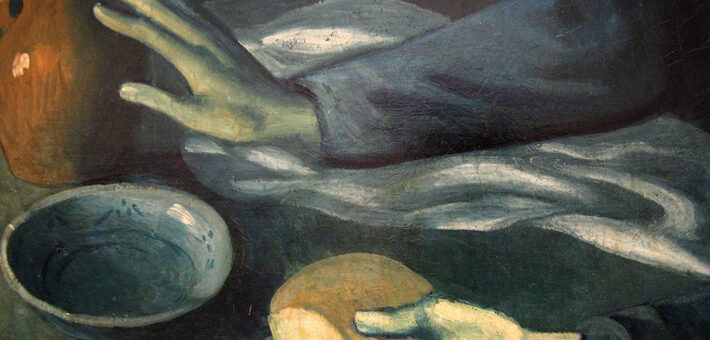Commentary on 1 Kings 2:10-12; 3:3-14
I was at a piano recital of my nephew and nieces last year.
We went out to dinner to celebrate their performances at the recital. My seven-year old nephew jumped out of his seat at dinner and declared that his oldest sister got a note wrong. My brother quickly corrected him and told him that we focus on what people get right rather than what they get wrong. She played over a 1,000 notes right and only got one note wrong. Life is like that. Oftentimes we focus on the one little thing that is wrong in the life of someone else rather than the many things that they are getting right.
King Solomon has received a lot of bad press in recent times. His father David has received even worse press. There are hints of this bad press in other books of the Bible/Deutero-canonical books like Sirach. Solomon starts out well as reflected in our reading here, but he falters at the end. Yet, if we only read the gospels, we would only see the positives of Solomon. It is possible to read this as part of a much larger narrative or as it is presented to us this Sunday as a self-contained narrative. I will go with the latter as I believe this depiction of Solomon has much to offer.
The Bible does not feature a lot of dreams, so our ears should perk up when we have one featured as we do here. Solomon keeps company with the likes of Jacob and Joseph in Genesis. We can also think of other important figures like Daniel from the Book of Daniel and Joseph in the New Testament who are associated with dreams. Finally, we are told that troubled figures like Saul receive no dreams (1 Samuel 28:6, 15). So I would argue that the dream of Solomon is participating in the tradition of blessings established in Genesis 1 and seen repeatedly in Genesis’ stories of Abraham and Sarah, Isaac and Rebekah, Jacob and his wives, and Joseph.
Solomon’s greatness in 1 Kings 3 resides in his preference for relationships over things. Solomon has not always followed this as we see in his struggle to succeed his father, David. Here in this dream Solomon opts to focus on relationships rather than things. The language of relationship appears in many ways, but perhaps never more clearly than in 3:6. This verse focuses on God’s “great and steadfast love” by repeating the phrase twice. “Great and steadfast love” shines forth as one of the most important concepts in the Hebrew Scriptures. It can be translated, and is translated, in almost innumerable ways from mercy to kindness. Another important part of this concept is loyalty. This “great and steadfast love” is what Moses experiences from God, but it is also something we are all called to share with each other as Ruth shares it with Naomi.
The two appearances of this “great and steadfast love” bookend the idea of heart that stands at the center of this reading. “Heart” is a very important concept in the Old Testament. It stands at the center of our understanding of what it means to be human in the Old Testament. Solomon’s greatness resides in his understanding of his father’s greatness. His father’s heart is at the center of his greatness. Let us pull back a little and think about what “heart” actually means in the Old Testament.
The individual person is located at the center of a group of relationships in the view of the Old Testament. The Old Testament views the heart as we often view the mind. The understanding of anatomy in the ancient world was problematic. They understood the brain was important, but did not fully understand its functioning; hence, they stressed the heart and gave it functions we would often associate with the brain. This understanding magnifies the importance of the heart. The Lord can look at the heart and not be fooled by exterior signs. This leads to the election of David over his more superficially appealing older brothers. Psalm 90:12 will stress the importance of the heart as it explains to us: “So teach us to count our days that we may gain a wise heart.” Here, we see wisdom associated closely with the heart.
The word “heart” appears three times in this short passage, translated from two different Hebrew words. It indicates to us what was foremost in Solomon’s desires. Since he desires the interior and profound rather than the superficial, Solomon becomes the hero of this story. Today we are more challenged than ever to overcome superficial materialistic consumerism for the profundity of relationships and the personal growth they offer. This is true wisdom whether it be in Solomon’s time or our own. This allowed Solomon to see the beauty in his father’s life.
A wise heart allows Solomon to see all the virtue in King David’s life. King David certainly struck a number of wrong notes during his reign, but a wise heart allows Solomon to look elsewhere. He looks at the relationship between David and God, which implies the importance of the other relationships in King David’s life. David’s capacity for relationship allows him to benefit from the relationships of the prophets Gad and Nathan, who tell him things very hard for a king to hear. Yet, David hears them and corrects his course. Relationships offer us the opportunity to grow and trust more in the Lord as we see the Lord’s goodness to us in the care others express for us.
Solomon’s dream ultimately appears to move him in this direction. Dreams participate in the wisdom tradition and are often a source of wisdom in our lives when properly understood as they were by the two Josephs and Daniel. Solomon comes to a good understanding of this dream. It allows him to appreciate the virtues of his father and chart a course for his reign and administration centered on the heart, the place only the Lord sees perfectly.


August 16, 2015